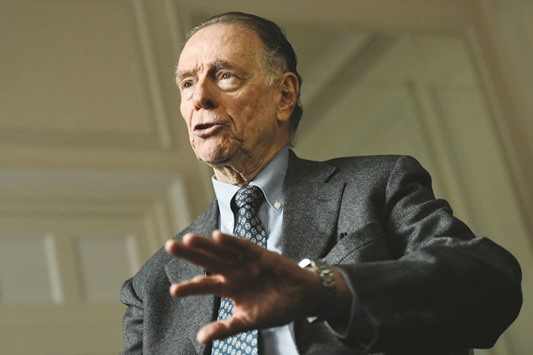The anti-doping laboratory that will test athletes during this year’s Olympic Games will be fully WADA compliant by this month’s deadline, Rio organising committee president Carlos Nuzman said yesterday. The World Anti-Doping Agency (WADA) stripped the $25 million Laboratorio Brasileiro de Controle de Dopagem (LBCD) of its accreditation in 2013 because it failed to meet required standards, re-instating it last year.
But unless Brazil changes its doping laws to conform to global regulations by the March 18 deadline, the anti-doping tests for the Games could be moved elsewhere at considerable cost.
“The lab will be fully accredited with the correct legal framework, which will mean full operations for the Games,” Nuzman told Reuters at a news conference in London.
“All the wording has been approved by the IOC, WADA, the federal government and the organising committee. We prefer to do it by March 15. We expect to have this final document by then.”
WADA rules say doping cases must be heard by an independent specialised tribunal as opposed to a general sports court, as is the current process in Brazil.
A Rio spokesman said Brazil’s President Dilma Rousseff would sign a decree to change the law with immediate effect.
Doping is one of many issues dogging the build-up to South America’s first Olympics, with Russia currently barred from international competition and Kenya struggling to implement new anti-doping measures by an April deadline or be ruled non-compliant. Preparations for the Rio Games have also been overshadowed by construction delays, an ailing Brazilian economy and the Zika virus. In a further blow this week, French prosecutors investigating corruption in athletics raised questions about the bidding process for the Rio and Tokyo Olympics.
Nuzman said Rio had nothing to hide.
“We did it a clean way,” he said. “The winning margin was large and we had strong support from a great number of (IOC)members.”
With around five months to go until the opening ceremony, Nuzman said the only venue still lagging behind was the velodrome, which is still without its wooden track. The test event has been pushed back two weeks to April 30.
“This is the only test event delayed out of 44 test events,” he said, adding that the golf course would be tested next week.
Nuzman also denied reports that athletes would be charged for mosquito screens for their rooms, saying the organising committee had agreed to pay for air conditioning to minimise the risk of being infected with the Zika virus.
The mosquito-borne virus has been linked to brain damage in thousands of babies in Brazil and both international health and sports officials are urging vigilance by those travelling to the Aug. 5-21 Rio Games. Asked whether he was concerned that only 47 percent of tickets had been sold for the Games, Nuzman said Brazilians “loved to leave it late”, pointing to the soccer World Cup.
But Nuzman said there were no plans to give away free tickets to children from low-income families.
“This is always a difficult situation,” he said. “The organising committee decided not to have invitational tickets.”
Rio chief says Olympic bid was ‘very clean’
AFP/Rio de Janeiro
Rio de Janeiro staged a “very clean” campaign for the 2016 Olympics, the chief organiser told AFP yesterday in response to a French investigation into the bid. Carlos Nuzman, president of the Rio 2016 Organising Committee, shrugged off any doubts about the integrity of the Brazilian bid before the International Olympic Committee (IOC) vote in 2009.
“We did a very clean and organised bid. We had a huge difference among all the candidates during all the rounds and in the end it was 66-32,” Nuzman said in an interview in London. Seven cities started the contest, with Rio beating Madrid in the final vote.
Asked what he knew about the French investigation, Nuzman said: “Nothing. It’s not our problem.” He added that the organising committee has had no contact with French prosecutors.
A French inquiry into corruption allegations against the former head of world athletics has been expanded to examine bidding for the 2016 Olympics, won by Rio, and for the 2020 Games, to be held in Tokyo.
“We are at the verification stage (to establish whether there has been any wrongdoing),” said a judicial source, who revealed that the inquiry began in December.
The inquiry is part of a wider investigation into Lamine Diack, Senegalese former president of world athletics body the IAAF, and his son, Papa Massata Diack.
The IOC has insisted there is “no evidence” of any wrongdoing.
Meanwhile, Nuzman was critical of a decision by the Australian Olympic Committee to bans its athletes from visiting Rio’s favelas, or slums, during the Olympics due to security fears.
Rio’s mayor, Eduardo Paes, has described the ban as a “source of aggressions to Brazil”.
“If you travel round the world you’ll see the same kind of buildings around the world—in Australia, in France, in India. It doesn’t matter where,” said Nuzman.
“And each place has a different name. You will find the same in any other country. I think it’s not a good measure or a good announcement, what they did.”
He added: “They need to remember they organised the Sydney Games (in 2000). And they had problems.”
But Nuzman did say that people seeking to visit the favelas should join official tours.
He said that the only unfinished venue in the Olympic park was the velodrome, which is due to be completed in two weeks.
He also played down the fact that only 47 percent of tickets for Olympics events have been sold, five months before the start of the Games. “Brazilians love to buy tickets at the last moment,” he said. “This happened with the (2014) World Cup.”

Olympic Games Rio 2016 Organising Committee president Carlos Arthur Nuzman speaks in London yesterday. (AFP)
